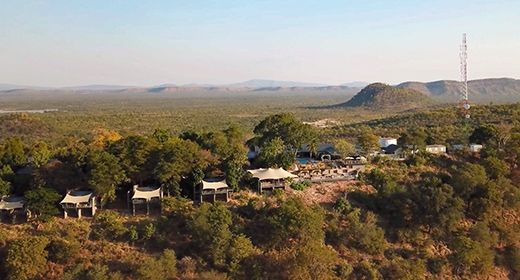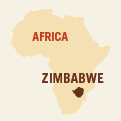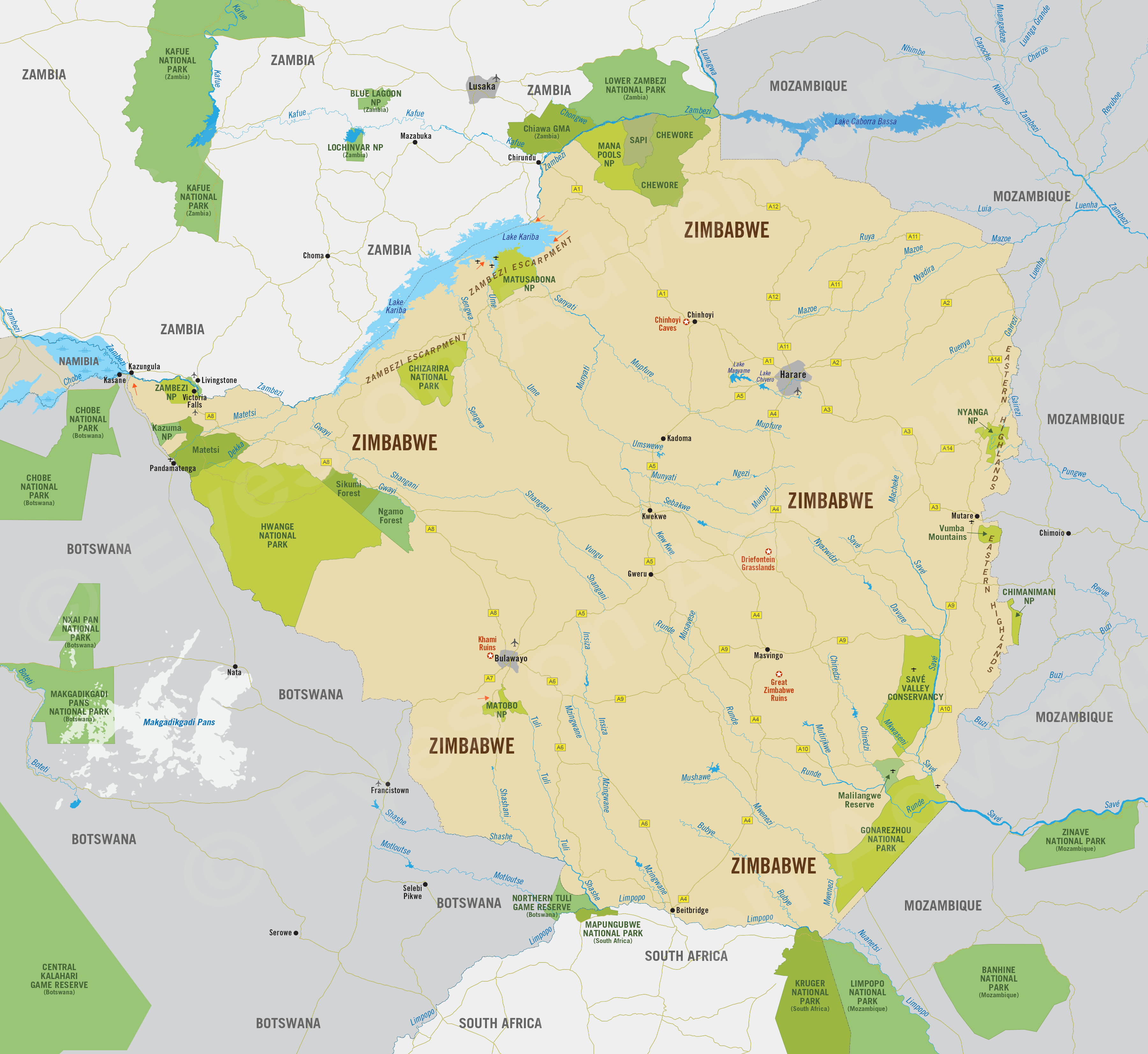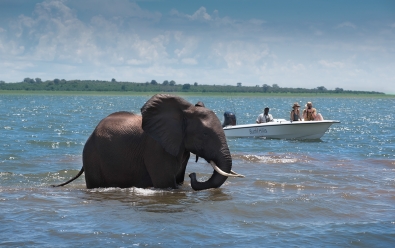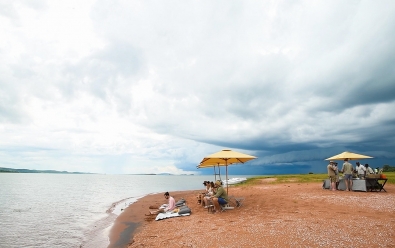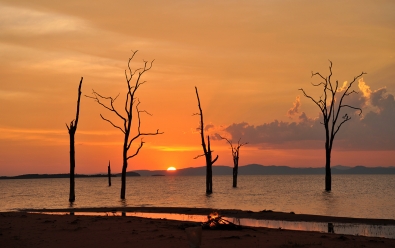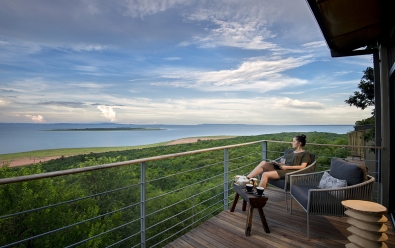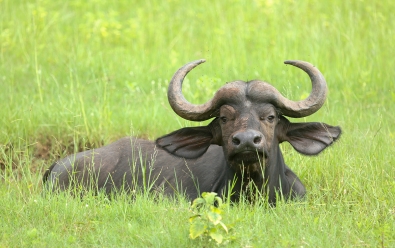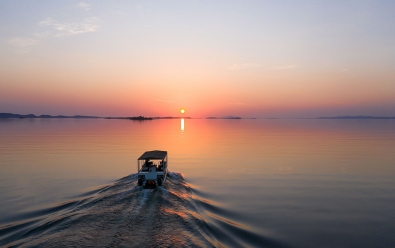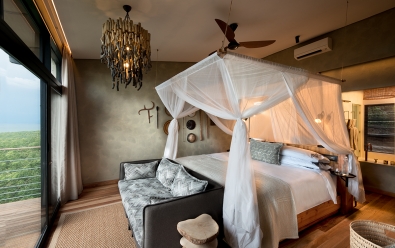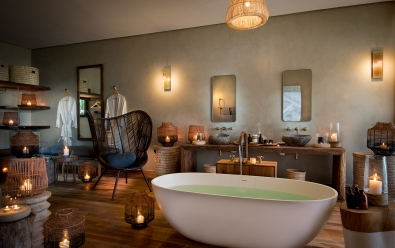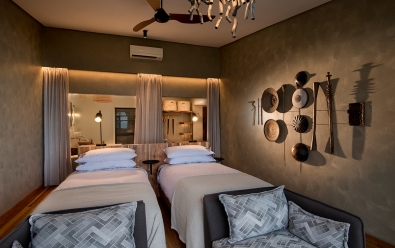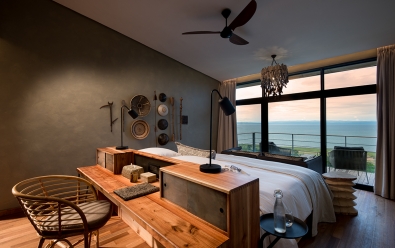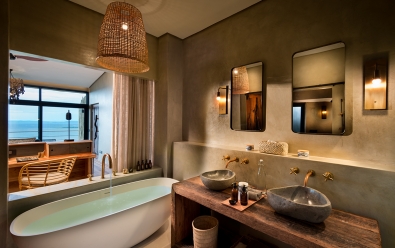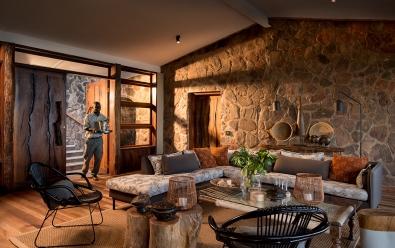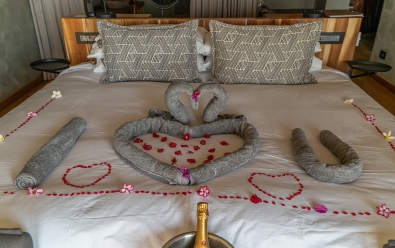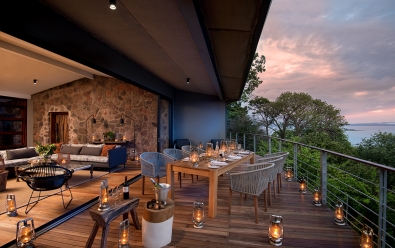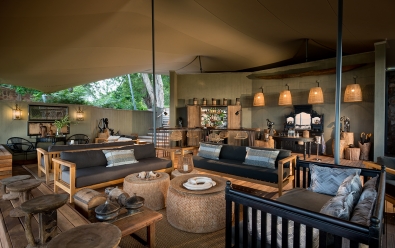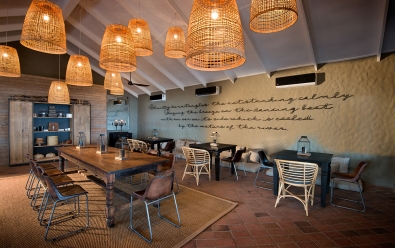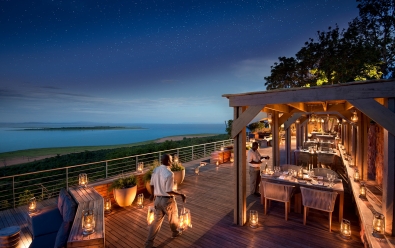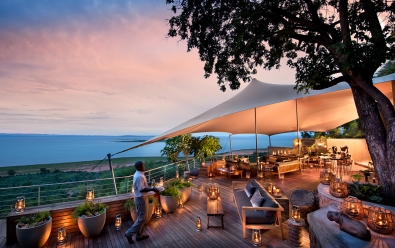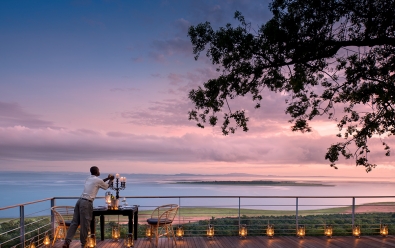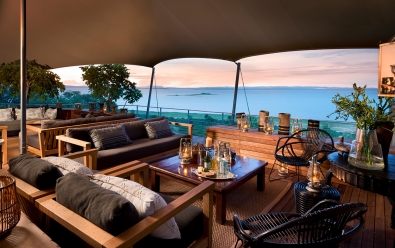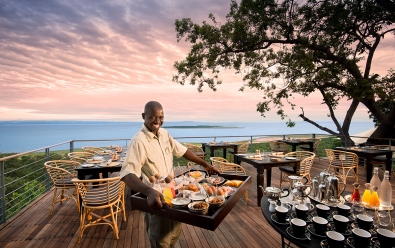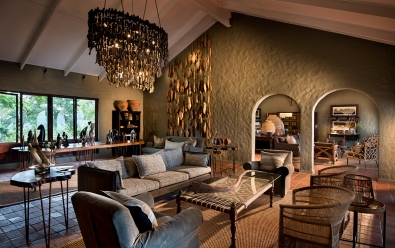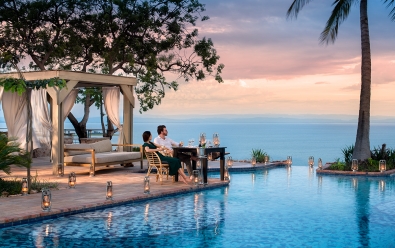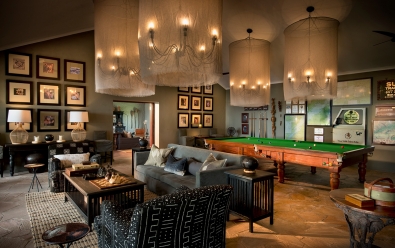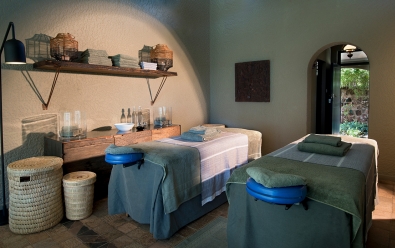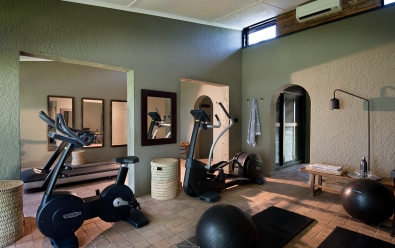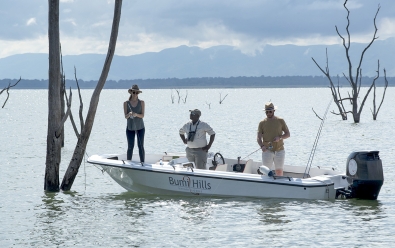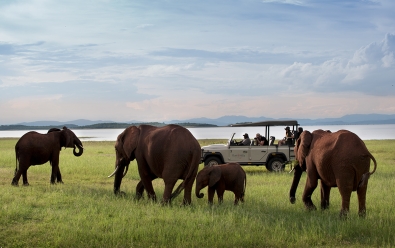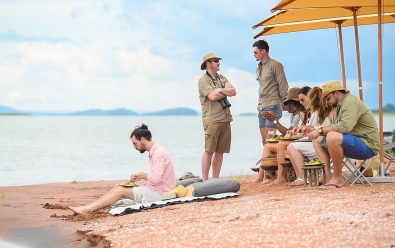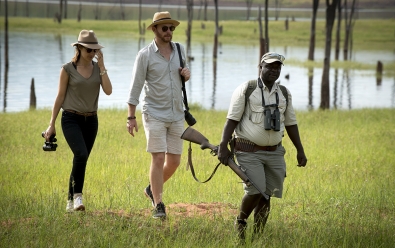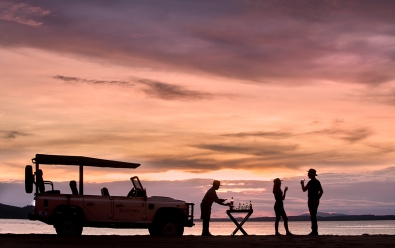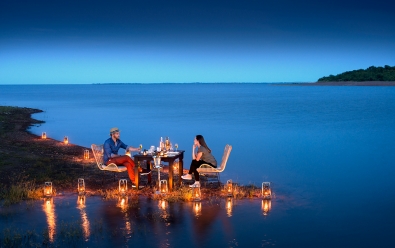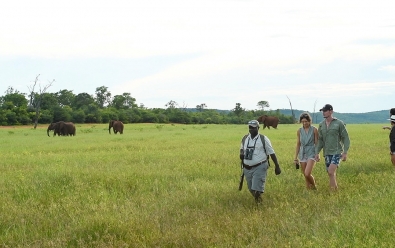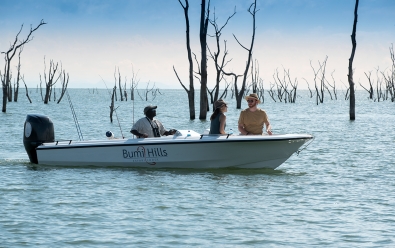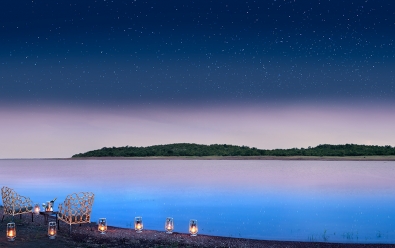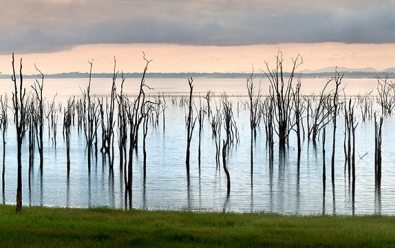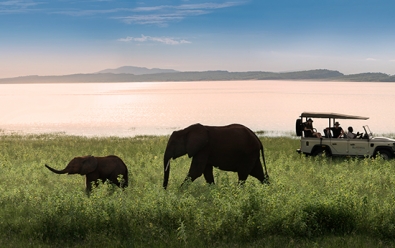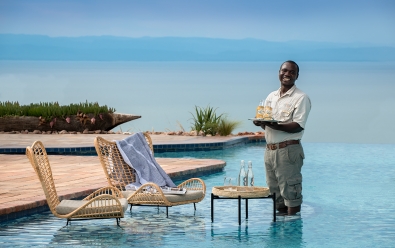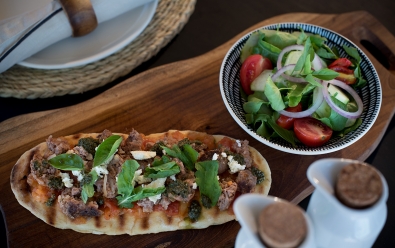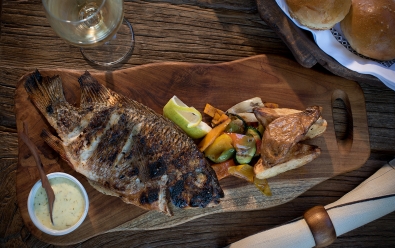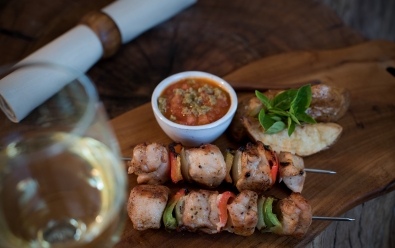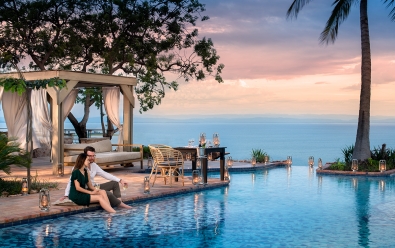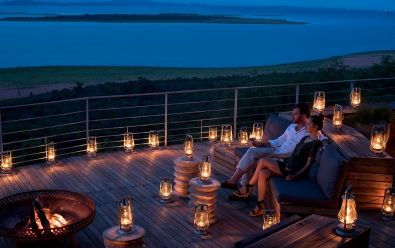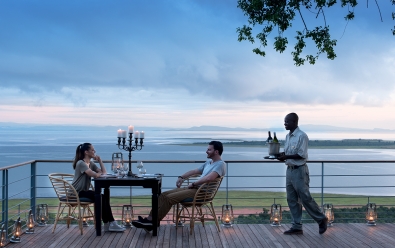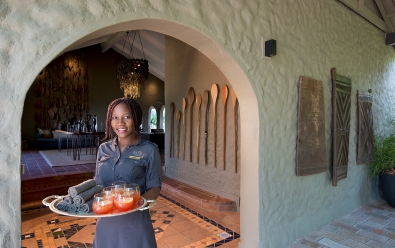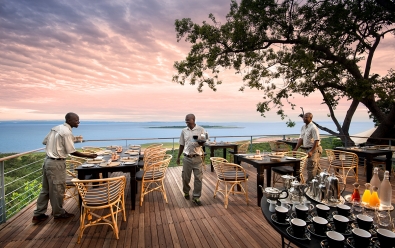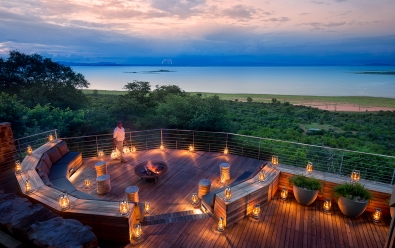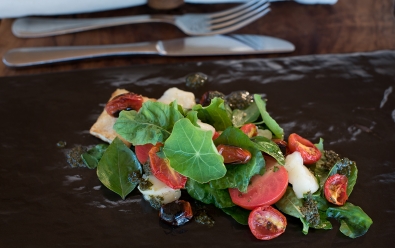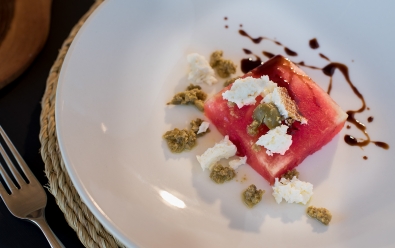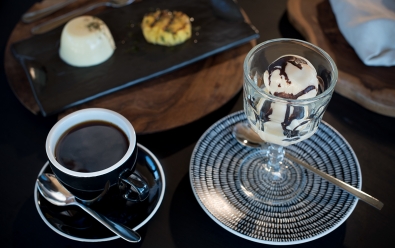Bumi Hills Safari Lodge
Inquire for lodging prices
Highlights
- Luxurious lodge on the shore of Lake Kariba.
- Wildlife viewing on both land and water.
- Incredible lake views, luxurious suites, excellent food and service.
- Game drives, boating, fishing, walking, cultural visits.
Location
- West of Matusadona NP
- Lake Kariba southern shore
- Northern Zimbabwe
Bumi Hills is a luxurious safari lodge located in a private conservancy atop a ridge overlooking Lake Kariba and offering land- and water-based activities.
The Bumi Hills Private Conservancy is located just west of Matusadona National Park and offers guests at the lodge an exclusive experience, with game drives (including optional night drives), boating, fishing, nature walks, and cultural experiences. Read more about Lake Kariba and Matusadona National Park below.
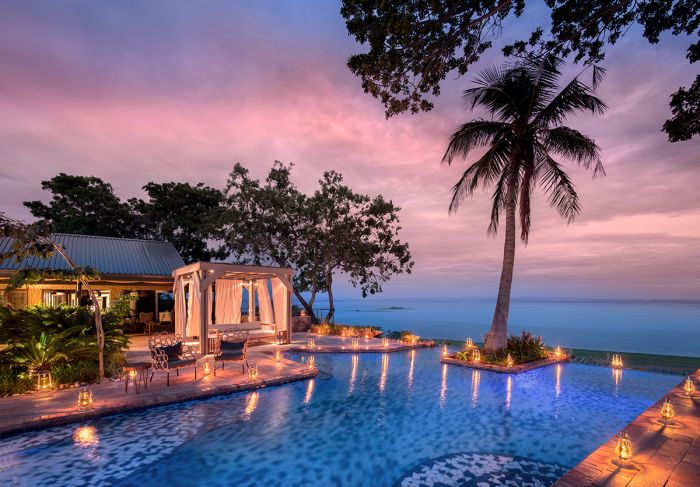
The infinity pool overlooking Lake Kariba at Bumi Hills Safari Lodge.
The lodge offers 10 luxurious guest suites, as well as the two-bedroom 'Baobab Villa', which sleeps up to five guests and is ideal for a family or group of friends traveling together. The spacious guest suites are fully air-conditioned and offer incredible Lake Kariba vistas from private outdoor decks. The well-appointed bathrooms include a relaxing bathtub and both indoor and outdoor showers.
The main lodge consists of an extensive living space, combining bath indoor and outdoor areas for guests to spread out, relax, enjoy fine dining experiences, and take in endless views of Lake Kariba and wildlife along the shores. The indoor spaces include multiple lounges and an air-conditioning dining room.
The outdoor spaces are located on two levels, with the upper level featuring a lush-planted courtyard with an infinity pool and a dining and viewing deck commonly used for breakfast or just relaxing and enjoying the vista. Stone steps lead down to a second outdoor deck that includes a variety of spaces used for relaxing and dining. A boutique shop, full-service spa, and gym are also available.
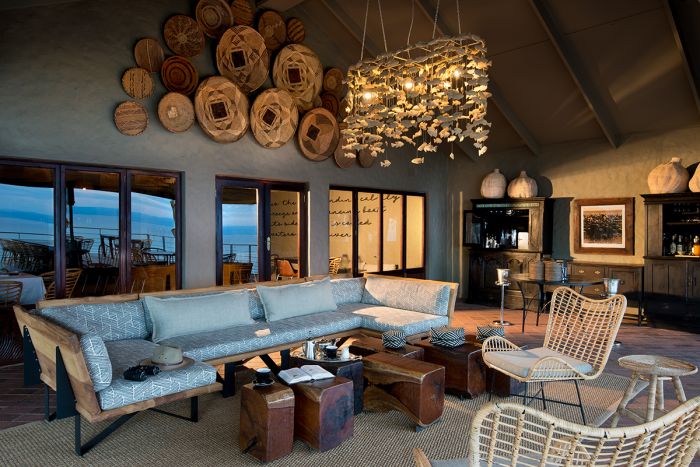
One of three indoor lounges at Bumi Hills Safari Lodge.
Bumi Hills Safari Lodge is an eco-friendly safari accommodation that operates primarily on solar energy, but a generator provides a backup power source and there is 24-hour electricity in the guest tents and the main area.
The lodge is owned and operated by African Bush Camps (ABC), a company founded by a professional African safari guide, who has a passion for protecting remote spaces and the wildlife that lives there.
African Bush Camps operates safari camps in Botswana, Zimbabwe, and Zambia. The ABC camps are fully sustainable, with minimal impact on the environment. The African Bush Camps Foundation runs local projects that empower the local communities wherever they operate safari camps. The company's aim is to conserve and preserve wildlife and natural areas in Southern Africa.
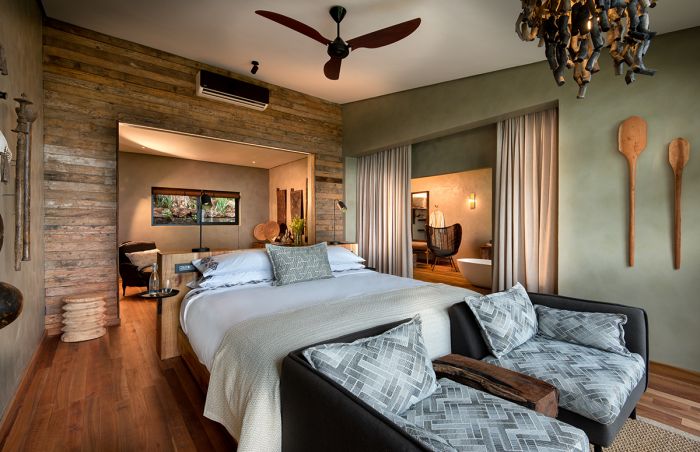
Guest suite bedroom at Bumi Hills Safari Lodge.
About Lake Kariba
Lake Kariba is the world's largest man-made (artificial) body of water (by volume). The lake was created between 1958 and 1963 during the construction of Kariba Dam along the lower Zambezi River, effectively flooding the Kariba Gorge.
The lake measures 139 miles (223 kms) in length and a maximum width of 25 miles (40 kms), covering an area of 2 150 square miles (5 580 sq kms). The mean depth of the lake is 95 feet (29 meters), with a maximum depth of 318 feet (97 meters). There are a good number of islands in the lake.
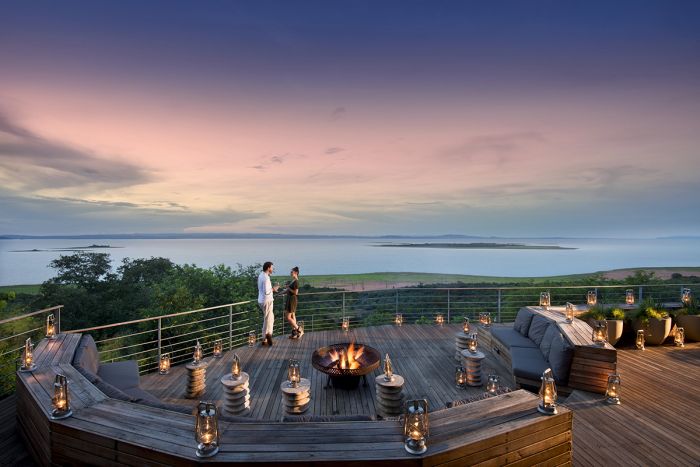
Campfire and view over Lake Kariba from Bumi Hills Safari Lodge.
During the period of years when the lake was filling up, the nutrient level was very high due to the decomposing vegetation, which created a thick layer of fertile soil on the lake bed. The lake is rich in fishes, some of them introduced (such as the Tanganyika sardine) and many more that were indigienous to the Zambezi River, including the African tigerfish (Hydrocynus vittatus), which is a popular sport species.
The lake contains healthy populations of hippo and Nile crocodile, while a good variety of land mammals are present along the lakeshore, including good numbers of elephant and buffalo. Other herbivores living around Lake Kariba include waterbuck, impala, zebra, greater kudu, sable, roan, and eland. Giraffe are conspicuously absent. Predators around the lake include lion, leopard, and spotted hyena. Birdlife on and around the lake is diverse and abundant, with over 400 species recorded.
About MATUSADONA NATIONAL PARK
Matusadona is one of Zimbabwe's most diverse national parks, with habitats that include the Lake Kariba shoreline, perennial rivers on its eastern and western borders, and the Zambezi Escarpment, which cuts east-west through the middle of the park.
Matusadona was proclaimed a non-hunting area in 1958 and gained national park status in 1975. The park covers 568 square miles (1 470 sq kms) of low-lying plains, rolling hills and open woodlands, as well as the rugged escarpment. The man-made Lake Kariba on Matusadona's northern boundary was created when the Kariba Dam was constructed on the Zambezi River between 1958 and 1963, effectively filling the Kariba Gorge with river water.
Once a haven for wildlife, especially elephant and the endangered black rhino, Matusadona was a well-visited and sought-after safari destination. Sadly, years of neglect and diminished financial resources resulting from the country's political turmoil, led to rampant poaching, which severely impacted wildlife numbers and virtually eliminated the black rhinos.
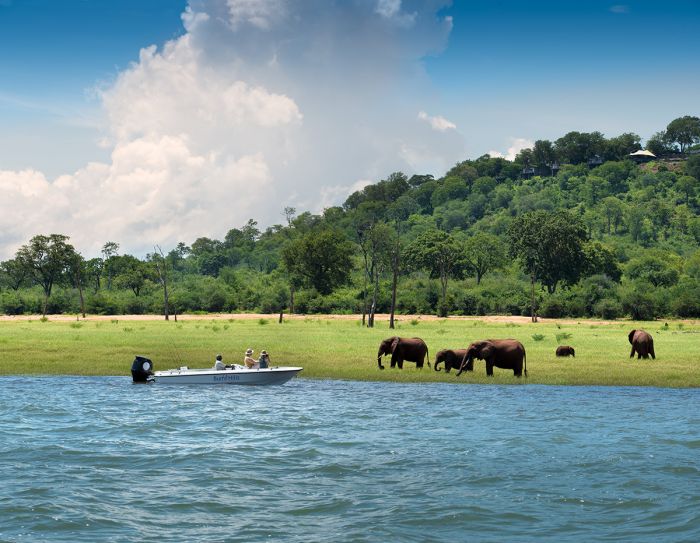
Boating safari on Lake Kariba with Bumi Hills Lodge atop the ridge.
Although the wildlife is still recovering, the beauty of this wilderness area remains the same, so there is great hope that the park will be restored to what it once was. In 2019, African Parks, a non-profit conservation group that partners with governments and local communities to rehabilitate and manage national parks, signed a 20-year agreement to manage Matusadona.
A good variety of mammals can be seen in Matusadona, including lion, leopard, spotted hyena, elephant, buffalo, waterbuck, impala, zebra, greater kudu, sable, roan, and eland. Giraffe are conspicuously absent. Black rhino are reportedly here in small numbers. Crocodile and hippo are also found along the shores of Lake Kariba. Birdlife in the park is excellent, with over 400 species recorded.
Matusadona receives few visitors, so the experience is very exclusive. There are several good lodges and tented camps to choose from in Matusadona, most of them along the lakeshore.
ROOMS INCLUDES & EXCLUDES CHILDREN FACILITIES ACTIVITIES
Accommodation
11 guest accommodations in total comprising:
- 10 luxurious, twin-bedded suites, each with two three-quarter beds (convertible to a double bed). The suites are fully-air-conditioned and include a private outdoor deck with seating overlooking the Lake Kariba.
- 1 luxurious, two-bedroom, 'Baobab Villa'. The suite can sleep up to 5 persons and is ideal for two couples, a group of friends, or a family. Each bedroom has its own en-suite facilities with both indoor and outdoor shower, double-basin vanity, flush toilet, and a bathtub. The bedrooms share a spacious lounge and outdoor deck. Includes the services of a private butler, safari guide, and dedicated safari vehicle.
The standard, one-bedroom suites feature en-suite facilities that include an indoor shower, outdoor shower, double-basin vanity, flush toilet, and bathtub.
The guest suites and lodge are set atop a ridge, high above the lakeshore and are connected to the main lodge by stone walkways the pass thru lush gardens and vegetation.
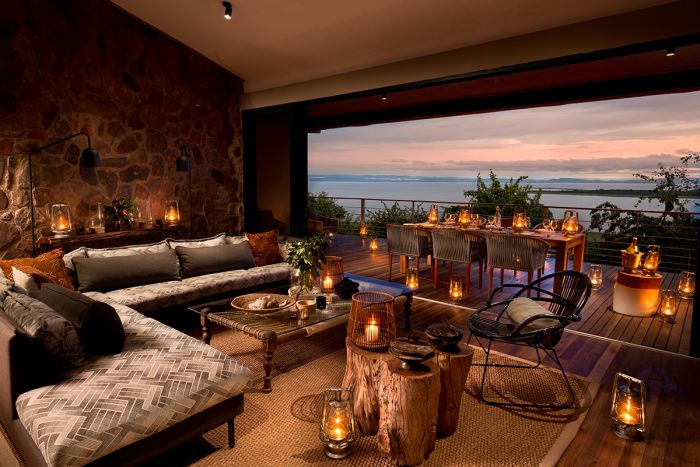
Baobab Villa lounge and dinner setting at Bumi Hills Safari Lodge.
The suites are constructed using stone and mortar, with cement walls to preserve the indoor temperature. The floors are made from hard wood. Lovely African décor adorns each room and comfortable furniture gives an 'at-home' feel. Large sliding doors provide plenty of natural light and views onto Lake Kariba.
Other items and features in the guest suites include:
- Air-conditioning.
- Lounge chairs.
- Suites are fully enclosed with glass windows and sliding doors, but also have mesh screens in case guests want fresh air.
- Mosquito netting over the beds (optional).
- Ceiling fan.
- Covered, outdoor veranda with seating and incredible lake views.
- Fully-furnished, luxury bathrooms.
- Clothes storage / wardrobe.
- Writing desk and chair.
- Mini-bar with fridge and coffee/tea station.
- Multi-plug charging station.
- Hair dryer.
- Wi-Fi is available in the main lodge area only.
- Personal amenities, including laundry basket, robe and slippers, liquid soap, body wash, shampoo and conditioner, bath salts, insect repellent, insect spray, room spray, vanity kit with cotton-tip swabs and cotton wool pads, shower cap, and umbrella.
Bumi Hills Safari Lodge can accommodate a maximum of 25 guests in total: 2 guests in each of the 10 standard suites and a maximum of 5 guests in the Baobab Villa.
Includes & Excludes
Includes:
- All meals and local beverages including wines, spirits and liqueurs, but excluding premium imported brands and Champagne.
- Twice-daily safari activities including game drives in open game-viewing vehicles, nature walks, boating safaris on Lake Kariba, catch-and-release fishing in the lake, and other scheduled camp activities (all accompanied by experienced guides).
- Laundry services are provided on a daily basis (weather permitting, items will be returned on the same day). Laundry is dried by the sun and on most days any laundry placed out in the morning will be returned by the evening.
- Bumi airstrip road transfers.
- Tourism Levy & VAT.
Excludes:
- Premium imported beverages and Champagne.
- Cultural visit to a nearby village.
- Spa treatments.
- Any applicable wildlife fee, park fee, reserve fee, concession fee, other land-use fee.
Single Supplement
A single supplement will apply for any room booked by a single traveler; please ask us for pricing.
Children
Children of any age are accommodated at Bumi Hills Safari Lodge.
- The Baobab Villa is a good option for families with children.
- Children under 16 years of age are charged a child rate and must share with an adult/s in the same tent.
- Children aged 16 years and older will pay applicable adult rates and can be accommodated in a separate suite or sharing with a parent.
- Families with children will be accommodated in the same vehicle as other guests for game drives. Private vehicles are an option (subject to availability and at additional cost).
- Walking activities are available to guests aged 16 years and above.
- Ngwana Club is a family-friendly program that offers kids of all ages a variety of safari-related activities.
- Young children must be supervised by their parents, as the camp is not fenced and is located in an area with wild animals.
Facilities
Bumi Hills Safari Lodge is located in a private concession and atop a high ridge overlooking the southern shore of Lake Kariba. The camp is not far from Matusadona National Park, which lies directly east of the concession.
The main lodge consists of an extensive living space, combining bath indoor and outdoor areas for guests to spread out, relax, enjoy fine dining experiences, and take in endless views of Lake Kariba and wildlife along the shores.
The lodge is constructed out of rock and brushed cement with beautiful, hand-crafted, tile floors. The spaces feature stylish, but comfortable furniture and African décor.
There are three separate lounges that lead thru open-air archways onto an outdoor courtyard and garden that includes space for private dining and an infinity swimming pool offering views over the lake below. One of the lounges serves offers billiards, board games, and a TV connected by satellite. A bar and tea/coffee station is available in one of the lounges.
For those looking for some pampering, there lodge has a full-service spa with a variety of massages and other wellness treatments. There its also a gym with cardio equipments, weights, balls, and yoga mats.
The indoor dining room is air-conditioned, but unless prohibited by weather, most dining is enjoyed on one of the various outdoor spaces to enjoy the lovely views and fresh air.
There outdoor spaces are on two levels, the upper level is an outdoor dining deck accessed from the main lounge and is commonly used for breakfast or just relaxing and enjoying the view. Stone steps lead down to a second outdoor deck that includes a variety of spaces used for relaxing and dining.
The lower level outdoor space is commonly used used for lunches and dinners and has superb views over the lake. The lower deck also includes a welcoming campfire area for socializing with other guests, an interactive pizza oven, and an outdoor lounge with a bar at the far end. Steps lead back up to the walkway leading to the guest suites.
Main guest area facilities include:
- Expansive main lodge that includes indoor and outdoor spaces on two levels.
- Multiple lounge spaces, dining areas, and bars, both indoors and outdoors.
- Incredible vistas from the lodge onto Lake Kariba below.
- Outdoor viewing decks on both levels with lounge seating.
- Infinity pool located on the upper level courtyard.
- Campfire area.
- Full-service spa.
- Gym with weights and exercise machines.
- Gift boutique.
- Wi-Fi and TV in the main lodge.
- Guest toilets in the main area.
Activities
Activities included in the rate:
- Day and night game drives in 4x4 Land Cruisers.
- Birding.
- Guided nature walks.
- Boating safaris on Lake Kariba.
- Catch-and-release fishing on Lake Kariba.
Optional activities at additional cost:
- Private activities are on offer (subject to vehicle availability, which needs to be booked in advance).
- Cultural visits to a local village to meet the villagers and learn about their lives.
- Spa treatments.
Example of a typical day:
- Early morning wake-up call. Morning wake-up and activity times vary according to the seasons, activities on offer, and wildlife sightings.
- Light breakfast before departing on the morning activity.
- Return to the lodge for a meal and rest period.
- Meet for afternoon tea and snacks (savory and sweet choices) before departing on the activity.
- Return to camp - freshen up or meet for drinks, followed by dinner.
- Enjoy a nightcap or discussion around the fire before retiring.
Great Good Fair Poor
- Jan
- Feb
- Mar
- Apr
- May
- Jun
- Jul
- Aug
- Sep
- Oct
- Nov
- Dec
When To Visit
Like most of Southern Africa, the Lake Kariba area has distinct seasonal variations that are primarily determined by local rains. Temperatures are mild to very warm all year.
The summer/rainy season begins around mid-November and continues into mid-April. During this time, much of the park and its game drive tracks become very difficult or even impassable and many of the safari camps are closed or have limited activities at this time.
The winter/dry season (from June through October) is the best time to visit Lake Kariba.
Bumi Hills Safari Lodge is open year-round.
WINTER / DRY SEASON
The dry season is the best time to visit the Lake Kariba region. The dry season is from May thru October and during this time, there is almost no rain whatsoever. The wildlife viewing is at its best in winter, with herds of elephant, buffalo, zebra, impala and other antelope congregating along the fringes of the lake. Rainwater pans and minor waterways inland dry up up as the dry season progresses and the animals are forced to remain close to the river.
After many years of neglect, there is a renewed effort to bring the region some much needed tourism and due to the very low density of accommodations here, Matusadona National Park and areas bordering the park are never crowded and you may not see any other people other than those in your camp.
May is a lovely time to visit, with lush, green vegetation still covering the landscape. Late rains are possible, but most days are sunny and clear. Daytime temps average 73-77°F (23-25°C), with overnight lows averaging 49-51°F (9-11°C).
June and July are the chilliest months of the year and rain is extremely unlikely. The bush begins to lose its verdant color and by late July, has become dry. Daytime temps are warm, averaging 75-78°F (24-26°C), but the early mornings are chilly and morning game drives will require dressing in layers. Overnight temps drop to an average of 47-51°F (8-10°C). Wildlife viewing, particularly around and remaining water sources and along the lake, is very good.
August and September are the very best months to visit the Lake Kariba area. Game viewing is outstanding, especially along the lake shore, as it is basically the only water source until the rains come in November/December. The landscape is now very dry and the only good grazing is on the floodplains along the lake, where good numbers of elephant, buffalo, impala, waterbuck, and other species congregate to feed. Temperatures are rising, with daytime highs reaching 86-91°F (30-33°C) and nights and early mornings only falling to a pleasant 55-63°F (13-17°C).
October is by far the warmest and driest month of the year. Wildlife viewing continues to be outstanding, with the lake fringes attracting good numbers of wildlife. The best time for safaris is early in the day before the sun gets too high and again later in the afternoon. Midday temperatures average 93-98°F (34-37°C) and the overnight temps only drop to 66-69°F (19-21°C). Due to the very warm days, safari drives are shorter, with animals seeking shade from mid-morning until late-afternoon.
Summer / Rain Season
The first rains typically fall anytime from late-October to mid-November, bringing relief to the parched landscape and the wildlife. The early part of the season is still a very nice time to visit the Lake Kariba region, with fresh grasses and new vegetation starting to emerge. Some herbivores, particularly impala, time their birthing season to coincide with the arrival of the summer rains.
November rains usually only occur every other day or so on average and are typically afternoon showers only lasting 1-2 hours. Temperatures are still quite warm, with daytimes averaging 88-92°F (31-33°C). Afternoon showers cool things down if they occur. Overnight temps drop to around 64-67°F (18-19°). Some safari camps may close for the season during November.
December through February receive the most rain, with most days receiving at least some precipitation, but all-day rains are unusual. Game-drive roads can become difficult or unusable at this time. The smaller waterways, which are typically dry for most of the year, are now flowing and wildlife disperses away from the lake to feed on the abundance of fresh vegetation. Wildlife viewing becomes somewhat more challenging, with animals now spread out away from the lakeshore.
March is approaching the end of the rainy season, with showers decreasing in frequency and volume. Temperatures are roughly the same from December through March, averaging 82-88°F (28-31°C) during the day and 64-70°F (18-21°C) overnight.
April is the transition month between the rainy and dry season, with only sporadic showers and gradually decreasing temperatures. The bush is verdant and thick after the months of rainy days and some safari tracks may still be difficult for driving. Daytime temps average 84-86°F (29-30°C) and overnight/early morning temps are comfortable, averaging 51-54°F (10-12°C).




